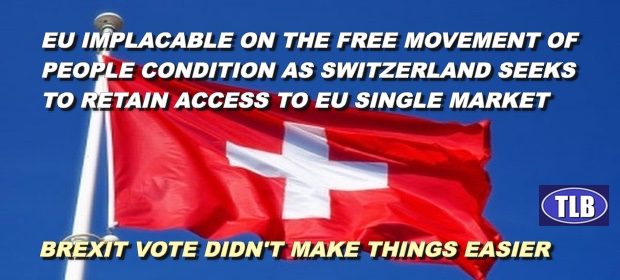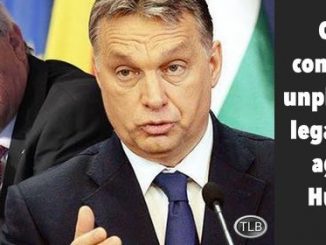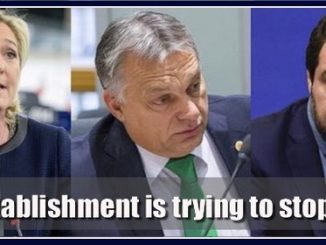
Swiss-EU talks reveal determination of EU to make no concessions to UK over Brexit terms
Patrick Wintour, Diplomatic editor
The European Union is to show its determination to make no concessions to the UK on Brexit terms by telling Switzerland it will lose access to the single market if it goes ahead with plans to impose controls on the free movement of EU citizens.
The Swiss-EU talks, under way for two years but now needing a solution possibly within weeks, throws up the exact same issues that will be raised in the UK’s exit talks – the degree to which the UK must accept free movement of the EU’s citizens as a price for access to the single market.
The Swiss are desperate to strike a deal in order to give its politicians time to pass the necessary laws to meet a February 2017 deadline imposed by a legally binding referendum in 2014.
The former president of the FDP-Liberal Radicals, Philipp Müller, on Sunday said the Brexit threat should serve as a warning to the Swiss, amid suggestions in Brussels the prospect of UK-EU exit talks meant there was less willingness to give ground on freedom of movement.
Müller suggested that the Swiss may unilaterally have to prepare a solution in which it suggests migration can be controlled in certain sectors if the Swiss and the EU jointly conclude unemployment is too high above the national average. He admitted the EU and the Swiss were currently miles apart in the talks.
It is not known if the proposal would be acceptable to an EU determined to protect free movement principles. Other Swiss politicians are suggesting the government should rerun the referendum.
The Swiss only narrowly voted to restrict immigration in the original 2014 referendum, with 50.3% in favour, and have been in unfruitful talks to implement the measure with the EU ever since. The Swiss are far more dependent on the EU for markets than the EU is on Switzerland, making the Swiss negotiating hand relatively weak. An impasse on the immigration issue threatens hundreds of other EU-Swiss bilateral agreements, as well as the imposition of tariffs.
Further talks were due a week ago, but were postponed by the commission claiming they were too distracted by Brexit.
The president of the European parliament, Martin Schulz, said the talks will not get easier, because “free movement of people now plays a bigger role, in light of the imminent Brexit negotiations”.
He added: “We have to find a solution with Switzerland because we need each other. I believe Switzerland [needs] the EU a bit more than the other way round.”
Switzerland is thrashing around for a compromise but Johann Schneider-Ammann, the Swiss president, has said a safeguard clause containing a national ceiling on EU migration has no chance. He has suggested action could be taken “when difficulties arise in a particular industry and in a specific region”.
This solution “could be an acceptable basis for discussion in Brussels”.
The Swiss president responded to the EU’s postponement of key talks last week by insisting Brussels address the Swiss question before it goes on holiday for the summer.
He said the EU commission president, Jean-Claude Juncker, had told him: “If there is Brexit there would be no more time to deal with Switzerland. But we insist even now the commission and the president listen to us.”

An internal Swiss commission studying the issue admits that quotas, ceilings, native priority in hiring, are not compatible with the bilateral agreement on the free movement of persons, whatever the studied variant.
One idea is for the Swiss to be entitled to impose quotas in industries when the unemployment rate in a particular trade, occupation or region rises strongly above the Swiss average. This would be overseen by a joint committee, in which representatives of Switzerland and the EU would sit.
Leading Swiss newspapers are arguing that the Swiss and the UK make common cause to reach a solution, saying the two countries are in the same boat. The UK is the home to 1.5 million EU residents, and Switzerland to 1.2 million.
The EU has previously shown its negotiating muscle by freezing research grants for Swiss universities worth hundreds of millions of euros and suspending the involvement of the Swiss in the Erasmus student exchange programme. The EU acted after the Swiss refused to sign a free labour market access deal signed by the EU in Croatia.
Swiss academics are worried that the Brexit vote means the EU will take a tougher line with the Swiss. “I don’t see any possibility for the EU to give anything to Switzerland,” said René Schwok, a professor at the University of Geneva and author of books on Swiss-EU relations.
Geneva University’s rector, Yves Flückiger, said he now feared the deadline would not be met. He said: “I think Europe will be less inclined to make an agreement that is favourable to the Swiss since that would open the way for disguised retention of the UK with particularly clauses.”
Flückiger also warned science contracts in Switzerland were already being lost due to the uncertainty about the future status of free movement. He said that before the 2014 vote each Swiss science contract had two or three times the chance of being retained than other European projects. He said: “We had this success because we are capable of attracting the best researchers in the world.”
ER recommends other articles from the Guardian




